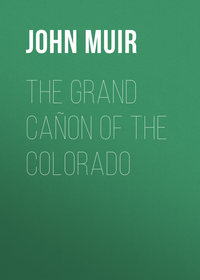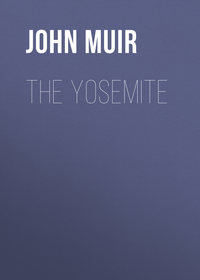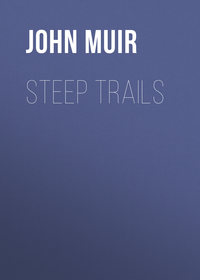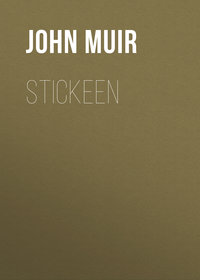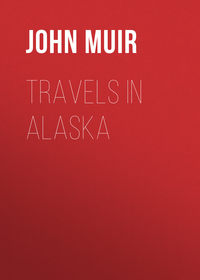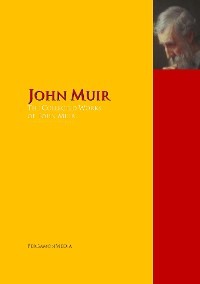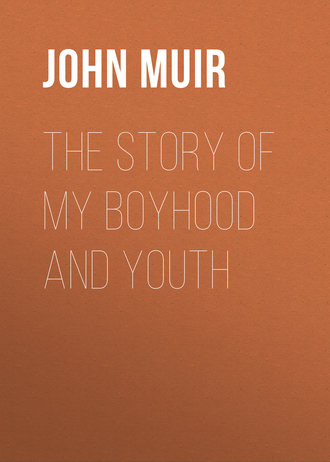 полная версия
полная версияThe Story of My Boyhood and Youth
Again—showing the natural savagery of boys—we delighted in dog-fights, and even in the horrid red work of slaughter-houses, often running long distances and climbing over walls and roofs to see a pig killed, as soon as we heard the desperately earnest squealing. And if the butcher was good-natured, we begged him to let us get a near view of the mysterious insides and to give us a bladder to blow up for a foot-ball.
But here is an illustration of the better side of boy nature. In our back yard there were three elm trees and in the one nearest the house a pair of robin-redbreasts had their nest. When the young were almost able to fly, a troop of the celebrated "Scottish Grays," visited Dunbar, and three or four of the fine horses were lodged in our stable. When the soldiers were polishing their swords and helmets, they happened to notice the nest, and just as they were leaving, one of them climbed the tree and robbed it. With sore sympathy we watched the young birds as the hard-hearted robber pushed them one by one beneath his jacket,—all but two that jumped out of the nest and tried to fly, but they were easily caught as they fluttered on the ground, and were hidden away with the rest. The distress of the bereaved parents, as they hovered and screamed over the frightened crying children they so long had loved and sheltered and fed, was pitiful to see; but the shining soldier rode grandly away on his big gray horse, caring only for the few pennies the young songbirds would bring and the beer they would buy, while we all, sisters and brothers, were crying and sobbing. I remember, as if it happened this day, how my heart fairly ached and choked me. Mother put us to bed and tried to comfort us, telling us that the little birds would be well fed and grow big, and soon learn to sing in pretty cages; but again and again we rehearsed the sad story of the poor bereaved birds and their frightened children, and could not be comforted. Father came into the room when we were half asleep and still sobbing, and I heard mother telling him that, "a' the bairns' hearts were broken over the robbing of the nest in the elm."
After attaining the manly, belligerent age of five or six years, very few of my schooldays passed without a fist fight, and half a dozen was no uncommon number. When any classmate of our own age questioned our rank and standing as fighters, we always made haste to settle the matter at a quiet place on the Davel Brae. To be a "gude fechter" was our highest ambition, our dearest aim in life in or out of school. To be a good scholar was a secondary consideration, though we tried hard to hold high places in our classes and gloried in being Dux. We fairly reveled in the battle stories of glorious William Wallace and Robert the Bruce, with which every breath of Scotch air is saturated, and of course we were all going to be soldiers. On the Davel Brae battleground we often managed to bring on something like real war, greatly more exciting than personal combat. Choosing leaders, we divided into two armies. In winter damp snow furnished plenty of ammunition to make the thing serious, and in summer sand and grass sods. Cheering and shouting some battle-cry such as "Bannockburn! Bannockburn! Scotland forever! The Last War in India!" we were led bravely on. For heavy battery work we stuffed our Scotch blue bonnets with snow and sand, sometimes mixed with gravel, and fired them at each other as cannon-balls.
Of course we always looked eagerly forward to vacation days and thought them slow in coming. Old Mungo Siddons gave us a lot of gooseberries or currants and wished us a happy time. Some sort of special closing-exercises—singing, recitations, etc.—celebrated the great day, but I remember only the berries, freedom from school work, and opportunities for run-away rambles in the fields and along the wave-beaten seashore.
An exciting time came when at the age of seven or eight years I left the auld Davel Brae school for the grammar school. Of course I had a terrible lot of fighting to do, because a new scholar had to meet every one of his age who dared to challenge him, this being the common introduction to a new school. It was very strenuous for the first month or so, establishing my fighting rank, taking up new studies, especially Latin and French, getting acquainted with new classmates and the master and his rules. In the first few Latin and French lessons the new teacher, Mr. Lyon, blandly smiled at our comical blunders, but pedagogical weather of the severest kind quickly set in, when for every mistake, everything short of perfection, the taws was promptly applied. We had to get three lessons every day in Latin, three in French, and as many in English, besides spelling, history, arithmetic, and geography. Word lessons in particular, the wouldst-couldst-shouldst-have-loved kind, were kept up, with much warlike thrashing, until I had committed the whole of the French, Latin, and English grammars to memory, and in connection with reading-lessons we were called on to recite parts of them with the rules over and over again, as if all the regular and irregular incomprehensible verb stuff was poetry. In addition to all this, father made me learn so many Bible verses every day that by the time I was eleven years of age I had about three fourths of the Old Testament and all of the New by heart and by sore flesh. I could recite the New Testament from the beginning of Matthew to the end of Revelation without a single stop. The dangers of cramming and of making scholars study at home instead of letting their little brains rest were never heard of in those days. We carried our school-books home in a strap every night and committed to memory our next day's lessons before we went to bed, and to do that we had to bend our attention as closely on our tasks as lawyers on great million-dollar cases. I can't conceive of anything that would now enable me to concentrate my attention more fully than when I was a mere stripling boy, and it was all done by whipping,—thrashing in general. Old-fashioned Scotch teachers spent no time in seeking short roads to knowledge, or in trying any of the new-fangled psychological methods so much in vogue nowadays. There was nothing said about making the seats easy or the lessons easy. We were simply driven pointblank against our books like soldiers against the enemy, and sternly ordered, "Up and at 'em. Commit your lessons to memory!" If we failed in any part, however slight, we were whipped; for the grand, simple, all-sufficing Scotch discovery had been made that there was a close connection between the skin and the memory, and that irritating the skin excited the memory to any required degree.
Fighting was carried on still more vigorously in the high school than in the common school. Whenever any one was challenged, either the challenge was allowed or it was decided by a battle on the seashore, where with stubborn enthusiasm we battered each other as if we had not been sufficiently battered by the teacher. When we were so fortunate as to finish a fight without getting a black eye, we usually escaped a thrashing at home and another next morning at school, for other traces of the fray could be easily washed off at a well on the church brae, or concealed, or passed as results of playground accidents; but a black eye could never be explained away from downright fighting. A good double thrashing was the inevitable penalty, but all without avail; fighting went on without the slightest abatement, like natural storms; for no punishment less than death could quench the ancient inherited belligerence burning in our pagan blood. Nor could we be made to believe it was fair that father and teacher should thrash us so industriously for our good, while begrudging us the pleasure of thrashing each other for our good. All these various thrashings, however, were admirably influential in developing not only memory but fortitude as well. For if we did not endure our school punishments and fighting pains without flinching and making faces, we were mocked on the playground, and public opinion on a Scotch playground was a powerful agent in controlling behavior; therefore we at length managed to keep our features in smooth repose while enduring pain that would try anybody but an American Indian. Far from feeling that we were called on to endure too much pain, one of our playground games was thrashing each other with whips about two feet long made from the tough, wiry stems of a species of polygonum fastened together in a stiff, firm braid. One of us handing two of these whips to a companion to take his choice, we stood up close together and thrashed each other on the legs until one succumbed to the intolerable pain and thus lost the game. Nearly all of our playground games were strenuous,—shin-battering shinny, wrestling, prisoners' base, and dogs and hares,—all augmenting in no slight degree our lessons in fortitude. Moreover, we regarded our punishments and pains of every sort as training for war, since we were all going to be soldiers. Besides single combats we sometimes assembled on Saturdays to meet the scholars of another school, and very little was required for the growth of strained relations, and war. The immediate cause might be nothing more than a saucy stare. Perhaps the scholar stared at would insolently inquire, "What are ye glowerin' at, Bob?" Bob would reply, "I'll look where I hae a mind and hinder me if ye daur." "Weel, Bob," the outraged stared-at scholar would reply, "I'll soon let ye see whether I daur or no!" and give Bob a blow on the face. This opened the battle, and every good scholar belonging to either school was drawn into it. After both sides were sore and weary, a strong-lunged warrior would be heard above the din of battle shouting, "I'll tell ye what we'll dae wi' ye. If ye'll let us alane we'll let ye alane!" and the school war ended as most wars between nations do; and some of them begin in much the same way.
Notwithstanding the great number of harshly enforced rules, not very good order was kept in school in my time. There were two schools within a few rods of each other, one for mathematics, navigation, etc., the other, called the grammar school, that I attended. The masters lived in a big freestone house within eight or ten yards of the schools, so that they could easily step out for anything they wanted or send one of the scholars. The moment our master disappeared, perhaps for a book or a drink, every scholar left his seat and his lessons, jumped on top of the benches and desks or crawled beneath them, tugging, rolling, wrestling, accomplishing in a minute a depth of disorder and din unbelievable save by a Scottish scholar. We even carried on war, class against class, in those wild, precious minutes. A watcher gave the alarm when the master opened his house-door to return, and it was a great feat to get into our places before he entered, adorned in awful majestic authority, shouting "Silence!" and striking resounding blows with his cane on a desk or on some unfortunate scholar's back.
Forty-seven years after leaving this fighting school, I returned on a visit to Scotland, and a cousin in Dunbar introduced me to a minister who was acquainted with the history of the school, and obtained for me an invitation to dine with the new master. Of course I gladly accepted, for I wanted to see the old place of fun and pain, and the battleground on the sands. Mr. Lyon, our able teacher and thrasher, I learned, had held his place as master of the school for twenty or thirty years after I left it, and had recently died in London, after preparing many young men for the English Universities. At the dinner-table, while I was recalling the amusements and fights of my old schooldays, the minister remarked to the new master, "Now, don't you wish that you had been teacher in those days, and gained the honor of walloping John Muir?" This pleasure so merrily suggested showed that the minister also had been a fighter in his youth. The old freestone school building was still perfectly sound, but the carved, ink-stained desks were almost whittled away.
The highest part of our playground back of the school commanded a view of the sea, and we loved to watch the passing ships and, judging by their rigging, make guesses as to the ports they had sailed from, those to which they were bound, what they were loaded with, their tonnage, etc. In stormy weather they were all smothered in clouds and spray, and showers of salt scud torn from the tops of the waves came flying over the playground wall. In those tremendous storms many a brave ship foundered or was tossed and smashed on the rocky shore. When a wreck occurred within a mile or two of the town, we often managed by running fast to reach it and pick up some of the spoils. In particular I remember visiting the battered fragments of an unfortunate brig or schooner that had been loaded with apples, and finding fine unpitiful sport in rushing into the spent waves and picking up the red-cheeked fruit from the frothy, seething foam.
All our school-books were extravagantly illustrated with drawings of every kind of sailing-vessel, and every boy owned some sort of craft whittled from a block of wood and trimmed with infinite pains,—sloops, schooners, brigs, and full-rigged ships, with their sails and string ropes properly adjusted and named for us by some old sailor. These precious toy craft with lead keels we learned to sail on a pond near the town. With the sails set at the proper angle to the wind, they made fast straight voyages across the pond to boys on the other side, who readjusted the sails and started them back on the return voyages. Oftentimes fleets of half a dozen or more were started together in exciting races.
Our most exciting sport, however, was playing with gunpowder. We made guns out of gas-pipe, mounted them on sticks of any shape, clubbed our pennies together for powder, gleaned pieces of lead here and there and cut them into slugs, and, while one aimed, another applied a match to the touch-hole. With these awful weapons we wandered along the beach and fired at the gulls and solan-geese as they passed us. Fortunately we never hurt any of them that we knew of. We also dug holes in the ground, put in a handful or two of powder, tamped it well around a fuse made of a wheat-stalk, and, reaching cautiously forward, touched a match to the straw. This we called making earthquakes. Oftentimes we went home with singed hair and faces well peppered with powder-grains that could not be washed out. Then, of course, came a correspondingly severe punishment from both father and teacher.
Another favorite sport was climbing trees and scaling garden-walls. Boys eight or ten years of age could get over almost any wall by standing on each other's shoulders, thus making living ladders. To make walls secure against marauders, many of them were finished on top with broken bottles imbedded in lime, leaving the cutting edges sticking up; but with bunches of grass and weeds we could sit or stand in comfort on top of the jaggedest of them.
Like squirrels that begin to eat nuts before they are ripe, we began to eat apples about as soon as they were formed, causing, of course, desperate gastric disturbances to be cured by castor oil. Serious were the risks we ran in climbing and squeezing through hedges, and, of course, among the country folk we were far from welcome. Farmers passing us on the roads often shouted by way of greeting: "Oh, you vagabonds! Back to the toon wi' ye. Gang back where ye belang. You're up to mischief, Ise warrant. I can see it. The gamekeeper'll catch ye, and maist like ye'll a' be hanged some day."
Breakfast in those auld-lang-syne days was simple oatmeal porridge, usually with a little milk or treacle, served in wooden dishes called "luggies," formed of staves hooped together like miniature tubs about four or five inches in diameter. One of the staves, the lug or ear, a few inches longer than the others, served as a handle, while the number of luggies ranged in a row on a dresser indicated the size of the family. We never dreamed of anything to come after the porridge, or of asking for more. Our portions were consumed in about a couple of minutes; then off to school. At noon we came racing home ravenously hungry. The midday meal, called dinner, was usually vegetable broth, a small piece of boiled mutton, and barley-meal scone. None of us liked the barley scone bread, therefore we got all we wanted of it, and in desperation had to eat it, for we were always hungry, about as hungry after as before meals. The evening meal was called "tea" and was served on our return from school. It consisted, as far as we children were concerned, of half a slice of white bread without butter, barley scone, and warm water with a little milk and sugar in it, a beverage called "content," which warmed but neither cheered nor inebriated. Immediately after tea we ran across the street with our books to Grandfather Gilrye, who took pleasure in seeing us and hearing us recite our next day's lessons. Then back home to supper, usually a boiled potato and piece of barley scone. Then family worship, and to bed.
Our amusements on Saturday afternoons and vacations depended mostly on getting away from home into the country, especially in the spring when the birds were calling loudest. Father sternly forbade David and me from playing truant in the fields with plundering wanderers like ourselves, fearing we might go on from bad to worse, get hurt in climbing over walls, caught by gamekeepers, or lost by falling over a cliff into the sea. "Play as much as you like in the back yard and garden," he said, "and mind what you'll get when you forget and disobey." Thus he warned us with an awfully stern countenance, looking very hard-hearted, while naturally his heart was far from hard, though he devoutly believed in eternal punishment for bad boys both here and hereafter. Nevertheless, like devout martyrs of wildness, we stole away to the seashore or the green, sunny fields with almost religious regularity, taking advantage of opportunities when father was very busy, to join our companions, oftenest to hear the birds sing and hunt their nests, glorying in the number we had discovered and called our own. A sample of our nest chatter was something like this: Willie Chisholm would proudly exclaim—"I ken (know) seventeen nests, and you, Johnnie, ken only fifteen."
"But I wouldna gie my fifteen for your seventeen, for five of mine are larks and mavises. You ken only three o' the best singers."
"Yes, Johnnie, but I ken six goldies and you ken only one. Maist of yours are only sparrows and linties and robin-redbreasts."
Then perhaps Bob Richardson would loudly declare that he "kenned mair nests than onybody, for he kenned twenty-three, with about fifty eggs in them and mair than fifty young birds—maybe a hundred. Some of them naething but raw gorblings but lots of them as big as their mithers and ready to flee. And aboot fifty craw's nests and three fox dens."
"Oh, yes, Bob, but that's no fair, for naebody counts craw's nests and fox holes, and then you live in the country at Belle-haven where ye have the best chance."
"Yes, but I ken a lot of bumbee's nests, baith the red-legged and the yellow-legged kind."
"Oh, wha cares for bumbee's nests!"
"Weel, but here's something! Ma father let me gang to a fox hunt, and man, it was grand to see the hounds and the lang-legged horses lowpin the dykes and burns and hedges!"
The nests, I fear, with the beautiful eggs and young birds, were prized quite as highly as the songs of the glad parents, but no Scotch boy that I know of ever failed to listen with enthusiasm to the songs of the skylarks. Oftentimes on a broad meadow near Dunbar we stood for hours enjoying their marvelous singing and soaring. From the grass where the nest was hidden the male would suddenly rise, as straight as if shot up, to a height of perhaps thirty or forty feet, and, sustaining himself with rapid wing-beats, pour down the most delicious melody, sweet and clear and strong, overflowing all bounds, then suddenly he would soar higher again and again, ever higher and higher, soaring and singing until lost to sight even on perfectly clear days, and oftentimes in cloudy weather "far in the downy cloud," as the poet says.
To test our eyes we often watched a lark until he seemed a faint speck in the sky and finally passed beyond the keenest-sighted of us all. "I see him yet!" we would cry, "I see him yet!" "I see him yet!" "I see him yet!" as he soared. And finally only one of us would be left to claim that he still saw him. At last he, too, would have to admit that the singer had soared beyond his sight, and still the music came pouring down to us in glorious profusion, from a height far above our vision, requiring marvelous power of wing and marvelous power of voice, for that rich, delicious, soft, and yet clear music was distinctly heard long after the bird was out of sight. Then, suddenly ceasing, the glorious singer would appear, falling like a bolt straight down to his nest, where his mate was sitting on the eggs.
It was far too common a practice among us to carry off a young lark just before it could fly, place it in a cage, and fondly, laboriously feed it. Sometimes we succeeded in keeping one alive for a year or two, and when awakened by the spring weather it was pitiful to see the quivering imprisoned soarer of the heavens rapidly beating its wings and singing as though it were flying and hovering in the air like its parents. To keep it in health we were taught that we must supply it with a sod of grass the size of the bottom of the cage, to make the poor bird feel as though it were at home on its native meadow,—a meadow perhaps a foot or at most two feet square. Again and again it would try to hover over that miniature meadow from its miniature sky just underneath the top of the cage. At last, conscience-stricken, we carried the beloved prisoner to the meadow west of Dunbar where it was born, and, blessing its sweet heart, bravely set it free, and our exceeding great reward was to see it fly and sing in the sky.
In the winter, when there was but little doing in the fields, we organized running-matches. A dozen or so of us would start out on races that were simply tests of endurance, running on and on along a public road over the breezy hills like hounds, without stopping or getting tired. The only serious trouble we ever felt in these long races was an occasional stitch in our sides. One of the boys started the story that sucking raw eggs was a sure cure for the stitches. We had hens in our back yard, and on the next Saturday we managed to swallow a couple of eggs apiece, a disgusting job, but we would do almost anything to mend our speed, and as soon as we could get away after taking the cure we set out on a ten or twenty mile run to prove its worth. We thought nothing of running right ahead ten or a dozen miles before turning back; for we knew nothing about taking time by the sun, and none of us had a watch in those days. Indeed, we never cared about time until it began to get dark. Then we thought of home and the thrashing that awaited us. Late or early, the thrashing was sure, unless father happened to be away. If he was expected to return soon, mother made haste to get us to bed before his arrival. We escaped the thrashing next morning, for father never felt like thrashing us in cold blood on the calm holy Sabbath. But no punishment, however sure and severe, was of any avail against the attraction of the fields and woods. It had other uses, developing memory, etc., but in keeping us at home it was of no use at all. Wildness was ever sounding in our ears, and Nature saw to it that besides school lessons and church lessons some of her own lessons should be learned, perhaps with a view to the time when we should be called to wander in wildness to our heart's content. Oh, the blessed enchantment of those Saturday runaways in the prime of the spring! How our young wondering eyes reveled in the sunny, breezy glory of the hills and the sky, every particle of us thrilling and tingling with the bees and glad birds and glad streams! Kings may be blessed; we were glorious, we were free,—school cares and scoldings, heart thrashings and flesh thrashings alike, were forgotten in the fullness of Nature's glad wildness. These were my first excursions,—the beginnings of lifelong wanderings.
II
A NEW WORLD
Stories of America—Glorious News—Crossing the Atlantic—The New Home—A Baptism in Nature—New Birds—The Adventures of Watch—Scotch Correction—Marauding Indians.
Our grammar-school reader, called, I think, "Maccoulough's Course of Reading," contained a few natural-history sketches that excited me very much and left a deep impression, especially a fine description of the fish hawk and the bald eagle by the Scotch ornithologist Wilson, who had the good fortune to wander for years in the American woods while the country was yet mostly wild. I read his description over and over again, till I got the vivid picture he drew by heart,—the long-winged hawk circling over the heaving waves, every motion watched by the eagle perched on the top of a crag or dead tree; the fish hawk poising for a moment to take aim at a fish and plunging under the water; the eagle with kindling eye spreading his wings ready for instant flight in case the attack should prove successful; the hawk emerging with a struggling fish in his talons, and proud flight; the eagle launching himself in pursuit; the wonderful wing-work in the sky, the fish hawk, though encumbered with his prey, circling higher, higher, striving hard to keep above the robber eagle; the eagle at length soaring above him, compelling him with a cry of despair to drop his hard-won prey; then the eagle steadying himself for a moment to take aim, descending swift as a lightning-bolt, and seizing the falling fish before it reached the sea.


